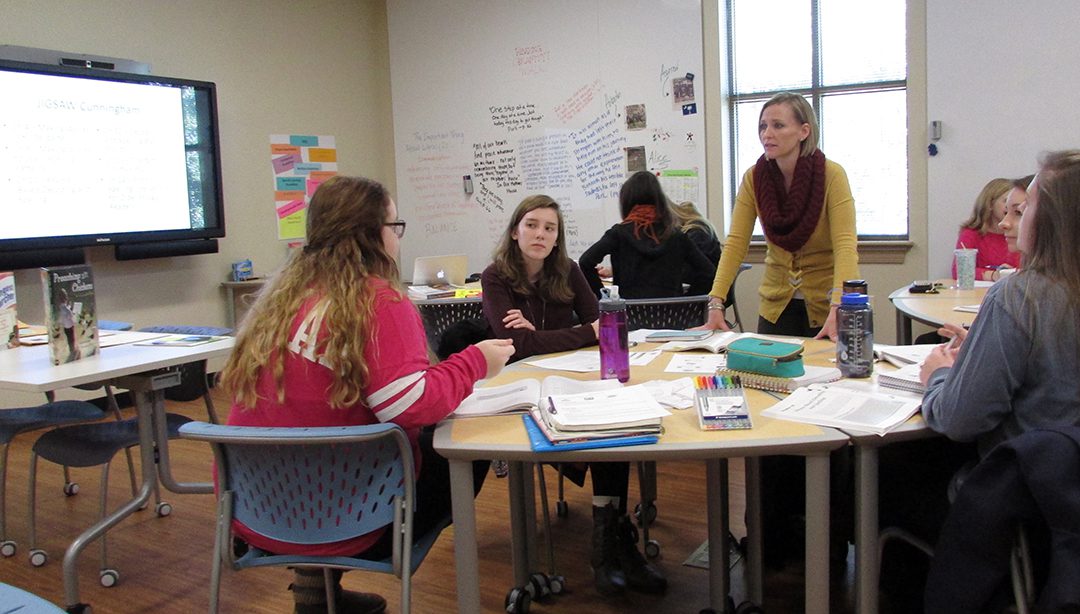Furman education department opens new project-based learning classroom

After 27 years in education, Berea High School teacher Sonja Bryant ’90 is still looking for fresh ways to reach her students.
She found that innovative approach in project-based learning.
As part of a personal finance unit in her Economics course, students start with “dream boards” outlining what colleges they would like to attend and what careers they are hoping to pursue. With Bryant as a guide, students map out detailed budgets for their school and living expenses and practice their job interview skills.
Bryant is one of eight Greenville County teachers to earn South Carolina’s new project-based learning (PBL) endorsement from Furman, the first of its kind in the country. Project-based learning is a dynamic approach to teaching in which students are engaged in actively exploring real-world problems and challenges.
Through the new Childers Project-Based Learning Classroom in Hipp Hall, Furman University hopes to introduce even more current and future teachers to project-based learning and model ways of implementing the methodology in classrooms across the Upstate.
Furman University President Elizabeth Davis will dedicate the new classroom Friday in honor of Marybeth Bunting Childers ’80 and Alfred Childers ’80, avid supporters of Furman and its Teacher Education Program.
Marybeth Bunting Childers ’80 was an education major at Furman who founded two schools and was named North Carolina Teacher of the Year. Her husband, Alfred Childers ‘80, is a former member of Furman’s Board of Trustees. Through the Childers’ generosity, Furman also established the annual Childers Education Foundation Teaching Excellence Awards in 2009, which recognizes first-year teachers with a love of content, love of teaching, and love of student.
“We are honored by Marybeth and Al Childers’ decision to make a significant contribution to Furman’s teacher preparation program. The Childers Project-Based Learning Classroom will facilitate modeling by Furman faculty so teacher candidates can experience–and later implement–student-driven instructional programs that foster collaborative interactions among their students,” said Education Professor and Department Chair Nelly Hecker. “The classroom will allow us to transition preservice and in-service teachers– likely to teach following the traditional ways in which they were taught–into active participants eager to design student experiences based on deep inquiry.”
The classroom features four movable, multi-functional learning spaces, along with interactive smart screen technology and whiteboard walls. In a PBL classroom, the teacher serves as a facilitator of student learning instead of as a traditional lecturer, explained Troy Terry, director of Graduate Studies at Furman.
“Our ongoing efforts to promote inquiry-based learning in our undergraduate and graduate teacher preparation programs will enable our teachers to better meet the needs of the 21st century learner,” Terry said. “The project-based learning initiative will change the way students learn in South Carolina for the better.”
PBL courses were first offered at Furman in 2015 and are now part of Furman’s Master of Arts degree in education with a concentration in curriculum and instruction.
The three-course PBL endorsement (an add-on teaching endorsement) was developed by the Riley Institute at Furman, Claflin University, College of Charleston, Furman University, Winthrop University, and the South Carolina Department of Education (SCDE). Experts from New Tech Network and educators teaching in South Carolina PBL schools also participated in the process.
After completing the PBL endorsement at Furman, Jigna Monty Desai, a science teacher at Greenville High School, has successfully used project-based learning to conduct eco-preneurship contests in her Environmental Studies classes. Students wrote green business plans for companies and received weekly mentoring from community members through Facetime and Skype.
“PBL has made my students more interested in the content,” said Desai, now in her 10th year of teaching. “It gives them the opportunity to see the relevance of what they are learning, and it has made me a better teacher.”
For more information about PBL at Furman, please contact Troy Terry in the Graduate Studies Office at troy.terry@furman.edu or (864) 294-2213.